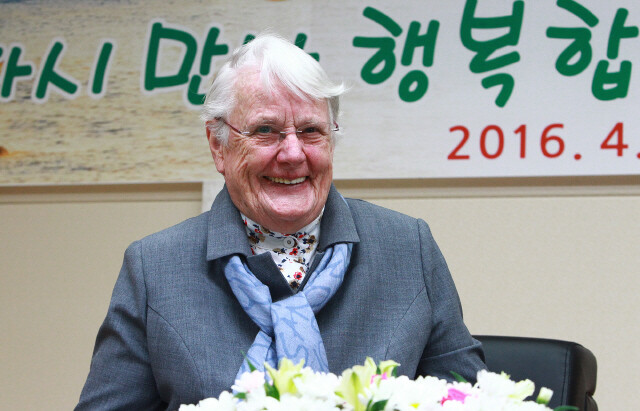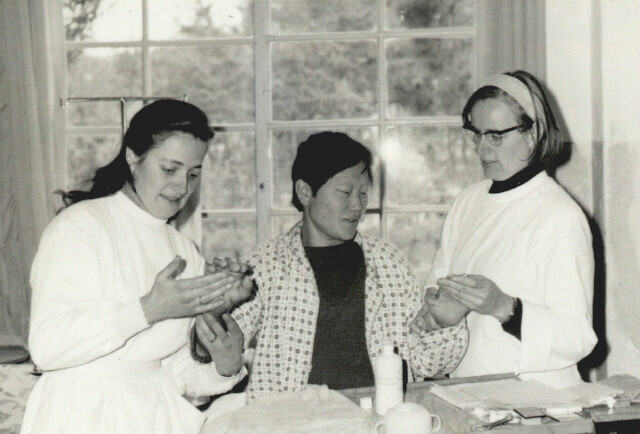hankyoreh
Links to other country sites 다른 나라 사이트 링크
40 years of selfless service: a nun speaks publicly for the first time

A land of separation; an island of despair. The moment they stepped off the boat and onto Sorok Island, they said goodbye to the rest of the world. For the Hansen’s disease patients, there was no future, no human rights. Nor was there hope - in their resignation, they had to fight to temptation to end their own lives. Their own family members were turning their backs on them: sending their loved ones to Sorok Island, then filing a death notice for them.
It was onto this island of abandonment that two Austrian nuns arrived. Alumnae of a state nursing school back home, Sisters Marianne Stoeger, now 82, and Margaret Pissar, now 81, were first sent to Sorok Island in 1962 and 1966, respectively. While others who worked there armed themselves against possible infection with masks, gloves, and quarantine gear, the two women, then in their mid-20s, wore only white gowns as they tended to some 6,000 patients. Even when their faces were spattered with blood and pus from wounds, they paid no mind.
The two sisters continued volunteering for the next four decades until Nov. 2005, when they suddenly left South Korea. Fearful of becoming a burden on the hospital after entering their seventies, they quietly departed early one morning, leaving only a letter behind.
Recently, both were invited back by the Sorokdo National Hospital, Sorokdo Catholic Church, and Goheung County, South Jeolla Province, for the hospital’s centennial anniversary on May 17. With Sister Margaret remaining at a sanatorium for treatment of mild senility, Sister Marianne arrived in South Korea alone on Apr. 13. To date, she had not answered any of the multiple requests for interviews she had received from local news media as news of the sisters’ inspiring story spread. She also declined awards from the national government and various groups.
“I didn’t want to do interviews because there was nothing at all special about life on Sorok Island,” Sister Marianne said shyly while meeting with the local press for the first time on Apr. 26 at Sorokdo Hospital.

Recalling her time on the island, she said, “The greatest joy came from seeing patients being discharged from the island and meeting their family members after their wounds healed.”
“It was through the power of the gospel of Jesus Christ that I was able to serve,” she added.
On her reasons for leaving eleven years ago, Sister Marianne explained, “I had had three operations at the time for colon cancer, and I determined that I couldn’t volunteer anymore.”
“It weighed heavily on my mind. I cried a lot as the boat left and Sorok Island faded in the distance,” she remembered.
She also said she often visits Sister Margaret and shares memories of their time on the island.
Sorokdo Hospital was established in 1916 by the Japanese during their occupation of Korea. Staff members addressed patients in crude language; patients had to call the staff members “Sir.” Beatings were routine, and patients were subjected to forced abortions and sterilization. It was said that Hansen’s disease patients died three deaths: a social death when segregated on the island away from the world, a biological death when their tragic life ended, and a death of humiliation when an autopsy was done on their body. With a two-day funeral observance practice, patients prayed to die on a Saturday, as dissections were not performed on Sundays.
The two nuns used respectful language with the patients and dined with them. They visited rooms in the early morning to give warm milk to older patients. They fixed up a warehouse to look after the patients’ uninfected children. They received medication from family members back home in Austria, and used financial support from their hometown women’s association to build an infant home, tuberculosis ward, psychiatric ward, and bath.
Neither spent a cent on themselves. When a broom broke, they taped it back together; when patients died, they mended and wore their clothes. They did not repair their own dormitory - even when centipedes began appearing there. The patients regarded the sisters as mothers: “Sorok Island grannies” who spoke in Jeolla Province dialect and enjoyed fermented soybean stew (dienjangjjigae).
“God is near us, and we live through His power,” Sister Marianne said on Apr. 26.
“As Jesus Christ lived through the pain of being nailed to the cross, so we must lived with joy in our faith,” she added.
On the way toward practicing love, she said, “You can love anyone, no matter how much you dislike them, if you feel that Jesus exists within that person.”
Sorokdo Catholic Church, under head priest Father Kim Yeon-jun, is currently planning a 120-minute documentary on the two sisters through the Marianne and Margaret Foundation, with a release date scheduled around late 2016. Goheung County is also planning to nominate both for the Nobel Peace Prize.
By Lee Kil-woo, senior staff writer
Please direct questions or comments to [english@hani.co.kr]

Editorial・opinion
![[Column] Season 2 of special prosecutor probe may be coming to Korea soon [Column] Season 2 of special prosecutor probe may be coming to Korea soon](https://flexible.img.hani.co.kr/flexible/normal/500/300/imgdb/original/2024/0426/3317141030699447.jpg) [Column] Season 2 of special prosecutor probe may be coming to Korea soon
[Column] Season 2 of special prosecutor probe may be coming to Korea soon![[Column] Park Geun-hye déjà vu in Yoon Suk-yeol [Column] Park Geun-hye déjà vu in Yoon Suk-yeol](https://flexible.img.hani.co.kr/flexible/normal/500/300/imgdb/original/2024/0424/651713945113788.jpg) [Column] Park Geun-hye déjà vu in Yoon Suk-yeol
[Column] Park Geun-hye déjà vu in Yoon Suk-yeol- [Editorial] New weight of N. Korea’s nuclear threats makes dialogue all the more urgent
- [Guest essay] The real reason Korea’s new right wants to dub Rhee a founding father
- [Column] ‘Choson’: Is it time we start referring to N. Korea in its own terms?
- [Editorial] Japan’s rewriting of history with Korea has gone too far
- [Column] The president’s questionable capacity for dialogue
- [Column] Are chaebol firms just pizza pies for families to divvy up as they please?
- [Column] Has Korea, too, crossed the Rubicon on China?
- [Correspondent’s column] In Japan’s alliance with US, echoes of its past alliances with UK
Most viewed articles
- 1No good, very bad game for Korea puts it out of Olympics for first time since 1988
- 2Division commander ordered troops to enter raging flood waters before Marine died, survivor says
- 3Korea’s 1.3% growth in Q1 signals ‘textbook’ return to growth, says government
- 4Will NewJeans end up collateral damage in internal feud at K-pop juggernaut Hybe?
- 5[Column] Season 2 of special prosecutor probe may be coming to Korea soon
- 6[Editorial] Korea’s surprise Q1 growth requires objective assessment, not blind fanfare
- 7[Column] ‘Choson’: Is it time we start referring to N. Korea in its own terms?
- 8‘We must say no’: Seoul defense chief on Korean, USFK involvement in hypothetical Taiwan crisis
- 9Korea sees more deaths than births for 52nd consecutive month in February
- 10Is N. Korea threatening to test nukes in response to possible new US-led sanctions body?